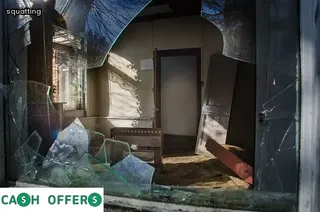In Washington, the legal definition of a squatter is someone who lives on another's property without the owner’s permission. Squatters are considered to be occupying the land or residence without any right or title and can be subject to legal eviction procedures.
Under Washington law, squatters are given certain rights such as the right to possess and occupy a property as long as they meet certain criteria. These criteria include actively living in the property, making improvements to it and paying taxes if applicable.
In some cases, squatters may even acquire title to the property after meeting certain requirements and living there for an extended period of time. To determine if a person is legally considered a squatter in Washington, it is important to understand both state and local laws related to squatting.

In Washington, a squatter may claim adverse possession if they have met certain requirements. To successfully obtain ownership of the property under adverse possession, the trespasser must occupy and possess the land for a period of at least 10 years in an open, notorious, and hostile manner.
This means that the squatter must use and occupy the land as if they were its true owner. Furthermore, payment of taxes on the property is also required in order to establish hostile possession.
Additionally, a squatter must provide continuous occupation of the property or pay rent to maintain their claim over the land. Lastly, all other legal owners must be excluded from the property while these requirements are being met.
It is important to note that squatters cannot acquire title through adverse possession when their occupancy is based on permission from an owner or other party with lawful authority to grant access.
Removing squatters from property can be a complicated legal process, especially in Washington. It is important to understand the laws and eviction procedures in place in order to effectively remove squatters from your property.
The first step is to determine if the squatter has gained any rights over the property, as squatting for a certain period of time may give them these rights. In Washington, this period of time is usually seven years or more.
After determining if any rights have been granted, you must then serve a notice of eviction on the squatter and file an unlawful detainer action with the local court. A hearing will then be scheduled for both parties to present their arguments.
If the court rules in favor of eviction, a writ of restitution will be issued that grants permission for law enforcement officers to physically remove the squatter from your property. As part of this process, it is necessary to follow all applicable laws and regulations regarding providing notice and filing paperwork correctly in order to ensure a successful eviction.

Securing your home against squatting is a critical step for any homeowner in Washington. Squatting is an illegal act and can be difficult to evict.
To best protect yourself, you must understand the laws governing squatters in the state, as well as the legal eviction process. It's important to be aware of your rights when it comes to unlawful occupants, what documents you need to serve them with, and how long they have before they must vacate the premises.
In some cases, it may be necessary to involve law enforcement or use self-help measures such as changing locks and posting physical notices on the property. It's also important to note that if a squatter has resided in your home for more than 30 days without permission or paying rent, they may gain certain legal rights which can complicate matters even further.
Understanding these laws and procedures is essential in order to ensure the safety of your home and avoid costly legal battles or other issues that could arise from an unlawful occupant situation.
Squatters in Washington have certain rights and responsibilities, depending on the length of their stay and the amount of damage they cause. Generally speaking, if a squatter has been on the property for less than 30 days, then they are considered a trespasser and can be removed without court action.
If a squatter has been living on the property for more than 30 days, then they gain additional protections under Washington law. In this situation, legal action must be taken to evict them from the property.
Furthermore, squatters may also claim constructive eviction if the owner does not provide adequate facilities or services that were promised when they took occupancy. This could include failure to maintain basic amenities such as heat, hot water or functioning plumbing systems.
Additionally, Washington law stipulates that squatters have a right to notice prior to any eviction proceedings; this means that owners must provide written notification of their intent to evict at least 10 days before filing an unlawful detainer lawsuit in court. Lastly, squatters may also be entitled to compensation for any improvements they made while living on the property which can further complicate matters and lead to costly litigation.
It is important for both landlords and tenants alike to understand their full rights and responsibilities under Washington law in order to avoid costly disputes down the line.

Color of title is an important concept to understand when it comes to squatter's rights in Washington. In general, a squatter can obtain legal ownership of property if they can prove color of title.
This legal doctrine states that if a squatter has been occupying the land and paying taxes on that land for a certain period of time, then there is evidence that they have some claim to the land. The length of time varies depending on the state, but in Washington this period is seven years or more.
During this period, the squatter must also be able to prove that they had good faith belief in their right to possess and own the property, such as by paying taxes or making improvements on it. If these criteria are met, then the squatter can gain legal ownership through adverse possession.
Color of title is an important factor when dealing with any issue related to squatters' rights in Washington and understanding how it works is essential for navigating eviction proceedings and other legal matters related to squatting in the area.
When it comes to squatters in Washington, property taxes are one of the most important requirements to consider. Squatters can be liable for taxes if they possess a deed, or in some cases an occupancy permit.
Tax obligations typically arise when a squatter holds title to a property for more than six months. In addition, Washington has specific laws designed to protect landlords from nonpayment of taxes by tenants and squatters.
Landlords have the right to pursue legal action if a squatter fails to pay their taxes on time. However, it is also important to note that some local jurisdictions have enacted programs which allow squatters who pay all applicable taxes and fees to reside in a dwelling without fear of eviction.
Ultimately, whether or not squatters must pay property taxes in Washington depends on their status and the nature of their agreement with the landlord.

In Washington, squatters may establish legal rights to a property if they meet certain criteria. First and foremost, the squatter must possess the land openly and notoriously to qualify as an occupier under the law.
This means that the squatter must have a physical presence on the property, visible to members of the public, and use it in a manner consistent with ownership such as maintaining it or making improvements. Additionally, the squatter must prove uninterrupted possession for at least 10 years and demonstrate intention to hold exclusive title to the property.
This includes paying taxes for the property or making other efforts to control access to it. Furthermore, any disputes over ownership must be settled by a court of competent jurisdiction and not by other means such as self-help eviction attempts or threatening behavior from either party.
Finally, all squatters should familiarize themselves with local laws on these matters since they can vary from county to county in Washington state. These criteria are necessary for establishing legal squatter's rights in Washington and should be taken into careful consideration before any action is taken by either party involved.
Evicting a squatter in Washington State is a process that must be carried out with extreme caution as it can involve expensive legal procedures and fees. It is important to first try to resolve the issue without involving the court system, as this will save time and money for both parties.
If this fails, then the landlord or property owner must file an unlawful detainer lawsuit in court. This requires providing evidence that the occupant is indeed a squatter and not a tenant, and must include details such as when the squatting began, whether rent was ever paid, or if any written agreements exist between the parties.
Once the case has been filed with the court, they will issue an eviction notice to be served by a local sheriff's office or constable. The squatter will then have three days to vacate the premises or face further legal action.
After this period of time has passed and if they have failed to vacate, then a writ of restitution may be issued which gives law enforcement officers authority to remove them from the premises. It is important for landlords or property owners to understand their rights under Washington State law before attempting any action against a squatter in order to avoid costly mistakes.

The best way to protect your property from squatters is to be proactive. Make sure your locks are secure and keep up with regular maintenance to ensure potential squatters cannot access your property.
Additionally, consider installing security cameras or lighting around the perimeter of your property and alerting local law enforcement if you observe any suspicious activity. It is also important to be aware of who is living on or near your property, especially if you own a rental unit.
Be sure to run background checks on all tenants before allowing them to move in, as this can help identify potential squatters or criminals. Finally, be familiar with the squatter laws in Washington so you know what steps you should take if a squatter attempts to inhabit your property without permission.
When determining the risk factors of having a squatter on your property in Washington, it is important to know what laws are in place as well as the legal eviction procedures. Squatters’ rights exist in certain limited circumstances, and they can be difficult to understand.
It is important to be aware of the relevant state laws and how they apply to you so that you can take steps to protect yourself from potential liability. In addition, knowing the proper eviction processes and deadlines for filing a notice with the court can help prevent squatters from settling on your property.
Property owners should also consider other precautionary steps such as installing locks or extra security measures. Finally, being familiar with local ordinances and regulations regarding squatting can help ensure that any issues are addressed quickly and efficiently.
When it comes to understanding the rights of squatters in Washington state, there are a few key points that everyone should be aware of. Squatting is the act of occupying land or buildings that one does not own or have a legal right to occupy.
While the law regarding squatting in Washington is relatively unclear and varies from county to county, it's important to remember that anyone who has been living on a property for more than a year without permission may be considered a squatter and can potentially gain certain rights under Washington law. Generally speaking, if a squatter has been living on the property for more than one year and has paid any taxes or fees associated with it, they may be able to claim adverse possession and secure ownership rights over the property.
Furthermore, in some cases, squatters may be able to challenge eviction proceedings by claiming landlord negligence or failure to properly terminate tenancy agreements. Ultimately, since local laws can vary greatly when it comes to squatters' rights in Washington, consulting with an experienced attorney is strongly advised in order to ensure that all legal requirements are met and your rights as a squatter are protected.

In Washington state, the laws surrounding evicting a squatter are complex and nuanced. Squatting is the act of taking possession of an abandoned property without permission or legal right.
Evicting a squatter in Washington is possible, but it can be difficult to do so without legal guidance. To begin the eviction process, you must first determine if there are any laws that provide squatters with rights or protections in your area.
Depending on where you live, this could include local ordinances or state statutes. It's important to understand these laws before attempting to evict a squatter as any missteps could lead to costly legal consequences.
Once you have determined what protections exist for squatters in your area, you must then take steps to file for eviction with the court. This can include filing an unlawful detainer action or sending a demand letter advising the squatter of your intent to evict and requesting that they vacate the property within the requisite timeframe.
After initiating the eviction process, you will need to follow all required procedures and wait for a court order before attempting to physically remove the squatter from your property. While it is possible to evict a squatter in Washington state, it is highly recommended that you seek legal counsel prior to doing so as there are various laws and regulations that may affect your ability to successfully remove them from your premises.
The eviction of a squatter in Washington can be a complicated and lengthy process, depending on the individual circumstances. Generally, it takes several weeks to initiate the legal proceedings and obtain a court order directing the squatter to vacate the property.
If the squatter fails to comply with the court order, then there may be further delays as law enforcement is required to forcibly remove them from the premises. To ensure that this process goes as quickly and efficiently as possible, landlords must take all necessary steps to satisfy any requirements for providing notice of their intent to evict.
Furthermore, landlords should familiarize themselves with Washington state laws regarding squatters’ rights so they understand their rights and obligations in these situations. With proper preparation, an eviction of a squatter in Washington can be completed within a few weeks or even less.
Yes, you can evict a tenant without a lease in Washington state, although the process is more complicated than when there is a written agreement between landlord and tenant. Squatter's rights in Washington are guided by the state's landlord-tenant laws, which provide specific rules for how to evict an occupant who has no tenancy agreement.
To legally evict someone without a lease, landlords must serve notice that includes the grounds for eviction and give the tenant time to vacate. If the tenant does not voluntarily leave within this timeline, then the landlord may pursue legal action through court proceedings.
However, it is important to note that tenants in Washington have several protections under state law regardless of whether or not they have a lease. For example, landlords must meet certain standards for habitability and may only terminate tenancy under certain circumstances.
Understanding these legal requirements can help landlords successfully navigate the eviction process when dealing with squatters in Washington state.